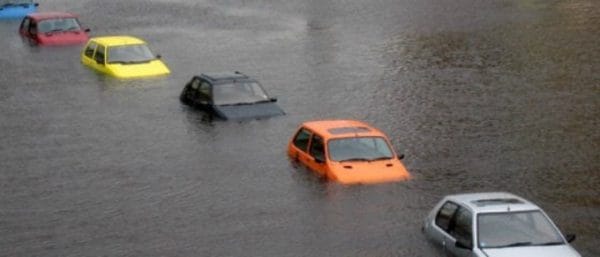How to Avoid Getting Soaked Buying A Flood Damaged Vehicle

Why flooded cars are dangerous to drive.
Many of the cars and trucks damaged in floods wind up for sale online, or even in used car lots. Here’s how to avoid getting soaked by buying a vehicle that is – simply – dangerous to drive.
Electronics, including computer chips, hate water. Since modern vehicles are heavy on electronics, water damage could short-circuit brakes, lights, airbags, turn signals, headlights, speedometer, entertainment/navigation system, even the heating/cooling system.
Perhaps most dangerous of all, a flood-damaged engine – especially if it’s been soaked in salt water – could cut out at any time, causing an accident. Why risk it?
Use your eyes, ears and nose
Eyes: Look for water stains. Outside, that would be a waterline or tiny bubbles on the exterior paint. Look for a waterline or fog on the inside of headlights and tail lights. Inside, look for signs of rust on the seat rails and examine upholstery and carpeting. If upholstery doesn’t match the interior or doesn’t fit tightly, it may have been replaced. Look for rust on the door jams
Check that the dashboard finish matches the door panels, and that there’s no trapped moisture behind the plastic lenses of the instrument panel. Open the glove box to check for moisture or debris. Look under the carpets for signs of dampness or mud. You’ve had enough muddy shoes in your family car to know what is normal and what is not.
Check under the hood, too. Look for telltale debris in the nooks and crannies. Oil and water don’t mix, so the dipstick can tell you whether there’s any unwanted H2O in the oil.
Ears: Check the seat belts. If there’s a grinding noise as you pull to attach, it could be from dried mud or dirt clogging the mechanism. Check the wires under the dashboard by flexing them. Wet wires become brittle when they dry, so listen for a cracking noise..
Nose: A musty smell is a dead giveaway, but the seller may have covered that up with air fresheners, so a strong perfume smell, including from cleaning solutions is another giveaway. Either way, turn on the air vents to smell what comes out of the vehicle’s ventilation system.
Take a test drive
Use all your senses to look for telltale signs of damage. Does the engine turn over quickly and easily, or is it cranky? Does the steering wheel turn smoothly, or does it “stick” indicating mud or silt in the steering column? Ditto for the windshield wipers and power window controls.
Does the airbag light go on? What about the radio? If it sounds muddy, maybe it was.

Get the facts to keep from getting a soaked vehicle. Photo: Creative Commons
Check the title, VIN and vehicle history report
Be especially wary of a vehicle whose title has been “lost.” Unscrupulous sellers may be hiding the fact that the car was declared a total loss by the insurance company, and perhaps sold as salvage to recoup some of that loss. These vehicles often are moved far from the flooded area to further hide their history. It’s called “title washing.”
You can look up a vehicle’s title history including its salvage history for free via the seven-digit vehicle identification number, or VIN. Check the National Insurance Crime Bureau VINCheck , or the National Motor Vehicle Title Information System, a joint effort of the US Department of Justice and the American Association of Motor Vehicle Manufacturers.
Many used car dealers give a free vehicle history report from services such as CarFax, a good sign the dealer and the vehicle have nothing to hide. If the seller doesn’t offer one, get it yourself. If you suspect the vehicle has been flood damaged, you can get a free CarFax Flood Damage Check.
Get an independent inspection
You have legal protections including the so-called federal Lemon Law (the official name is the Magnuson-Moss Warranty Act), which provides compensation for buying defective vehicles, including motorcycles and RVs. But getting your money back can be time consuming and even expensive if you have to hire an attorney.
It’s up to you to do your own due diligence, and the best way is to have your vehicle inspected by an independent mechanic you trust before you sign on the dotted line. If the seller refuses, walk away. Fast.
